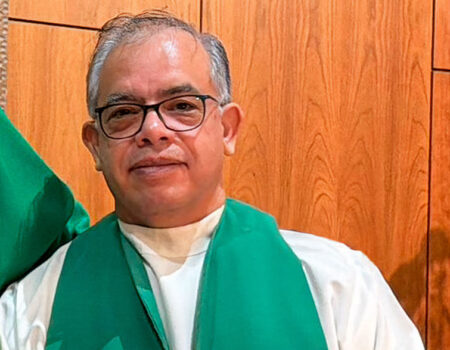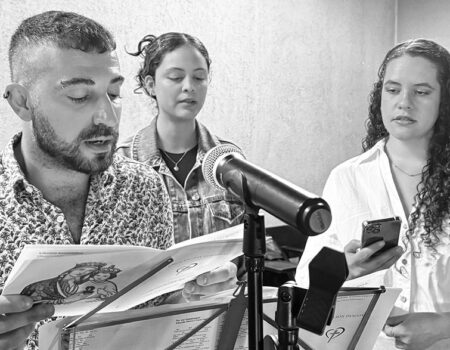Together for the Heart of Jesus: a fraternity that becomes a mission
Tuesday September 30, 2025

When we talk about shared mission, many people first think of collaboration in the field: priests, brothers, sisters, laypeople, and volunteers united around the same pastoral project. But before this is lived out in the world, shared mission must be envisioned, experienced, and savoured at home, meaning within the community. In a fragmented world marked by individualism, competition, and the quest for power, discussing shared mission is not just a pastoral strategy or an organisational choice. It is a prophetic act. It is a way of living the Gospel against the tide. It shows that the Church can still be a place of true fraternity, mutual respect, and fruitful collaboration. ‘By this everyone will know that you are my disciples, if you have love for one another’ (John 13:35). In the vision of Father Jules Chevalier, Founder of the Missionaries of the Sacred Heart, mission is born from a pierced Heart, open to all. Living the shared mission today means making our communities prophetic places, spaces where the world can see that love is stronger than barriers, that fraternity is possible, that God is near.
According to Pope Francis, shared mission is a vision of the Church in which all the baptised are called to be missionary disciples. It is a vision that requires a change of mentality, collaboration among different members of the Church, and a tangible commitment to service and the proclamation of the Gospel. He further notes that this shared mission is a source of joy and renewal for the Church. By working together, the various members of the Church can strengthen their unity and sense of belonging.
This mission is not only for a few specialists. It is entrusted to everyone who wishes to live according to the spirit of the Heart of Jesus: with compassion, fidelity, courage, and gentleness. Sharing this mission means becoming a collective sign of hope in a world that longs for genuine love. ‘You did not choose me, but I chose you and appointed you so that you might go and bear fruit—fruit that will last.’ (Jn 15:16) This verse reminds us that vocation is not only personal but always directed towards service.
Jesus chose twelve apostles who differed in character, competence, and mission, but he gave them one table and one loaf of bread. If, even during their formation, the table, prayer, and mission are shared, a culture is built where differences do not cause division but instead complementarity. Therefore, we must act early on mindsets, structures, and concrete experiences. Waiting until the end of formation is already too late, as stereotypes will have become firmly established. This particularly calls on leaders who struggle to bring young people together in formation, especially when it is divided according to candidates’ choices. How can we speak of a shared mission tomorrow if we are not living it now?
It is a vision that requires a change of mentality, collaboration among different members of the Church, and a tangible commitment to service and the proclamation of the Gospel.
In our formation houses, from the beginning, we must clearly state that the primary call is to religious and missionary life, rather than to the priesthood or fraternity as two separate groups. Formators should emphasise the shared consecration: the same vows, the same charism, and the same commitment to the mission. They should also include common modules on religious vocation and shared mission in doctrinal and spiritual formation before any specific formation. It is better to avoid privileges or distinctive signs that highlight one vocation at the expense of the other.
All the while knowing that the world is not mainly seeking experts in theology or managers of institutions. It is hungry for genuine relationships, compassion, and lived truth. The shared mission becomes a prophetic space when it offers an incarnate response to this thirst: communities that not only speak of Christ but also make him visible through the way they are together.
A shared mission becomes prophetic when it moves beyond merely sharing tasks to embracing a sharing of charisms, vocations, and visions, with a deep respect for differences. It proclaims a Church that does not rank vocations but honours them all as essential to the Body of Christ. ‘There are different kinds of gifts, but the same Spirit; there are different kinds of service, but the same Lord.’ (1 Corinthians 12:4-5)
In this context, collaboration among priests, brothers, sisters, and laypeople becomes a living witness that the love of Christ can break down walls of separation. This diversity lived in unity serves as an image of the Kingdom. ‘The Church recognises that she must encourage the participation of all in the evangelising mission, for “the entire People of God proclaims the Gospel”.’ (Pope Francis, Evangelii Gaudium, §111)
The shared mission is also prophetic because it transforms us. It teaches us patience, listening, and recognising the other as a gift. It shows us how to step outside our certainties and discern together what the Holy Spirit inspires. ‘Bear one another’s burdens and so fulfil the law of Christ.’ (Galatians 6:2)
It makes us disciples on a journey, called to grow together in communion, forgiveness, and mutual trust. ’It is necessary to recognise with lucidity and courage that communion is the major challenge facing the Church. (Novo Millennio Ineunte, John Paul II, §43)
It is not easy. It is never perfect. But it is already a sign of the Kingdom. And it is, perhaps, our most beautiful way of being Missionaries of the Sacred Heart today.
We will share the mission of Christ as Jules Chevalier received and transmitted it: to make the Heart of Jesus known and loved worldwide, especially where love is most scarce. In practical terms, this involves witnessing to God’s compassionate love through our actions, words, commitments, and life choices.
Our houses of formation can become genuine laboratories of fraternity and evangelisation if we choose to see them differently: no longer simply as places of study or discipline, but as vibrant spaces of fraternity, mutual learning, and co-responsibility.
The mission belongs to no one; it passes through all of us. When we live it together, our gifts complement each other, our limitations are eased, and Christ becomes visible among us. Sharing the mission means accepting to be sent out together, like the disciples on their journey, so that the world may see and believe.
‘The mission is like a lamp: alone, it lights up a corner; together, it illuminates the whole house.’
Simon Lumpini, msc





